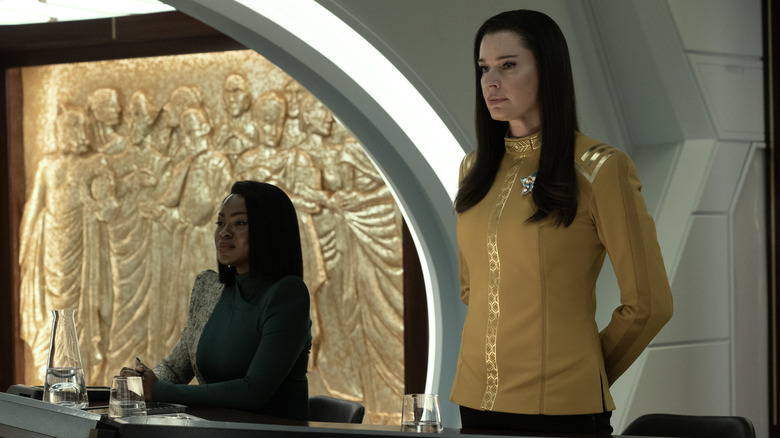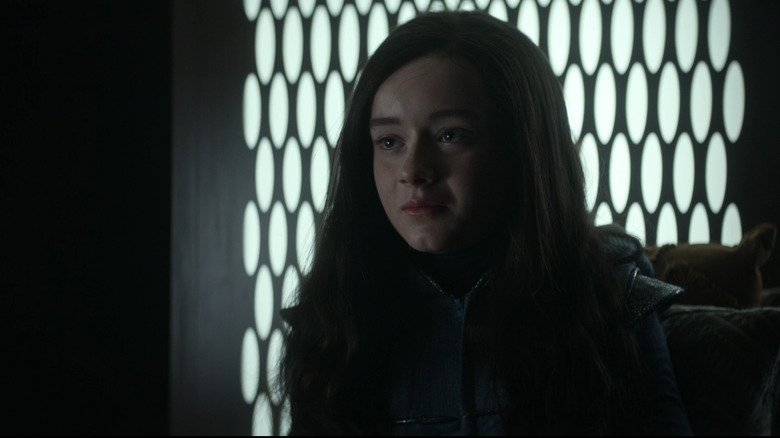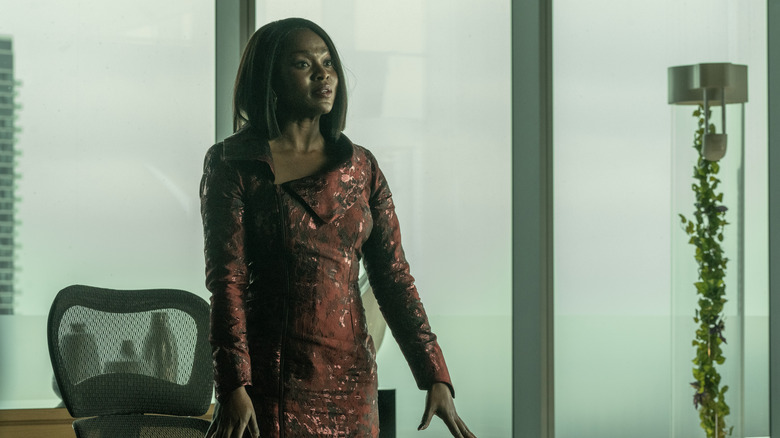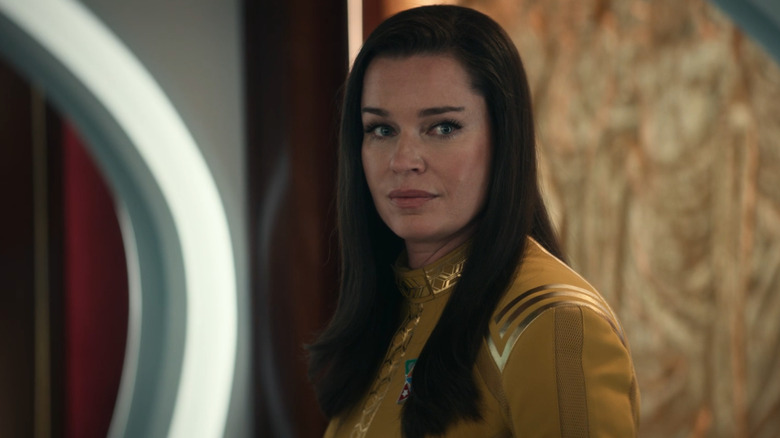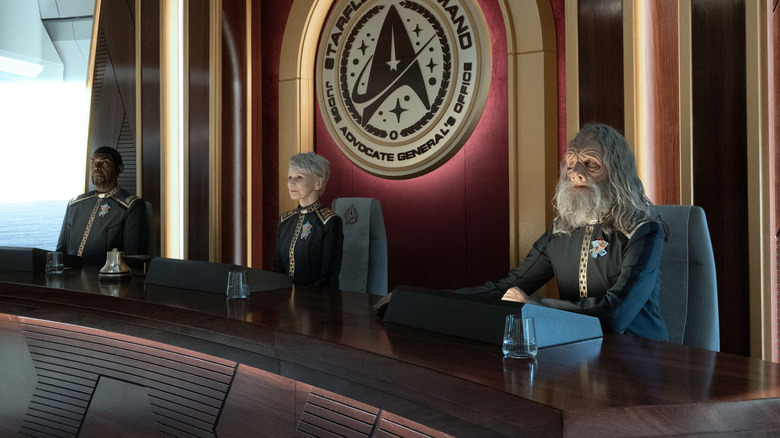Star Trek: Strange New Worlds' Latest Social Metaphor Is Classic Trek
This article contains spoilers for season 2, episode 2 of "Star Trek: Strange New Worlds."
"Star Trek," like most good science fiction, has used its out-of-this-world storytelling to impart lessons about our own world ever since it debuted back in 1966. In the original series, contemporary concerns like the Cold War, the civil rights movement, and the Vietnam War were examined through the use of allegory and metaphor. The utopian ideals of Starfleet and the Federation frequently came up against the beliefs and attitudes of various space travelers, forcing the crew to reconcile some pretty difficult concepts in a way that might be more digestible to audiences at home. The use of these storytelling techniques has varied across the other "Star Trek" shows, but there has always been at least an episode or two per "Star Trek" season that played with metaphor. (In the case of "Star Trek: The Next Generation," they took it a bit too literally, creating a species that only spoke in metaphors in the episode "Darmok.")
The first season of "Star Trek: Strange New Worlds" gave fans one of the best "Star Trek" metaphors in years, introducing non-binary villain Dr. Aspen (Jesse James Keitel), who forces Spock (Ethan Peck) to stop thinking of his split Vulcan and human heritage in such a binary manner. In the second episode of season 2, "Ad Astra Per Aspera," the Federation's ban that prevents Illyrians from serving in Starfleet provides a pretty stellar metaphor for what many LGBTQ Americans face, especially transgender Americans. "Star Trek" has never been shy with its metaphors, but this one might be more apt and necessary than ever.
Decisions based in fear
In the first season of "Strange New Worlds," Commander Una Chin-Riley (Rebecca Romijn) is arrested by Starfleet because they discover that she is an Illyrian, a species that has always used genetic modification in their expansion across the universe. Instead of terraforming planets or trying to change them in any way, the Illyrians modify themselves to their new homes, which means that there are many different kinds of Illyrians with different modifications. One would think Starfleet would appreciate that, given the Prime Directive and their own attempts at anti-colonialism, but unfortunately, leftover prejudices from the Eugenics Wars and World War III have made it illegal for Illyrians (or any genetically modified individuals) to serve in Starfleet. It's like if instead of "don't ask, don't tell," Starfleet said "don't even apply."
Una dreamed of being a Starfleet officer since she was a child, despite knowing that she wouldn't be welcome. During her court martial, she explains her desire to join and also shares memories from her childhood where she was ostracized and bullied for being an Illyrian on a Federation world. At the beginning of the episode we see her parents arguing over whether or not to take her in for medical treatment when she has a severely injured leg, because if doctors discover her augmentations, the family could be "outed" and face even more discrimination. It's a pretty harrowing moment that mirrors the threats trans people and their families face in states where medical transition or gender-affirming treatment has been outlawed, where taking a child to the hospital for a broken arm could get them taken away by the state. Young Una must suffer simply on account of who she is, and that sadly lasts well into her adulthood.
'A law does not make something just'
After the Federation's Captain Batel (Melanie Scrofano) explains the potential problems caused by genetic modification, even bringing up the idea that doing so is "playing God," Una's defender, an Illyrian named Neera (Yetide Badaki), explains the inherent dangers in those kinds of beliefs. Neera talks about the kinds of discrimination that happened for many years on Earth, highlighting that people had to hide their religions, who they loved, and who they really were from society in order to survive. She reminds the Federation that once upon a time, slavery was legal, and thus a law's existence doesn't make it just. She also points out that Starfleet breaks its own rules all the darn time, allowing people to get away with all kinds of nonsense: "It would seem that the rules of Starfleet only apply when a captain deems they do."
This is far from the first time that "Star Trek" has reckoned with interstellar prejudice, as Admiral Kirk (William Shatner) famously wrestled with his hatred of Klingons in "Star Trek VI: The Undiscovered Country," but it does feel a bit more pointed. Instead of serving as an allegory for the Cold War, "Ad Astra Per Aspera" is a scary look at what happens when personal bodily autonomy is restricted or removed entirely. If a Starfleet officer as prestigious and talented as Una could be threatened with 20 years in a Federation penal colony for simply being herself and still wanting to be a part of Starfleet, something is seriously wrong.
Una takes the stand
In order to join Starfleet, Una was forced to lie and hide her heritage, which made some of her friends and crewmates feel uneasy, but she had no choice. She had to try and pass as a human, and in her time on the stand during her court martial, she explains that "passing" has been a part of her life for as long as she can remember. The Illyrians who didn't have visible modifications could sometimes hide out as humans, dodging the misery of people's prejudice. She takes the stand to show the Federation Council what an Illyrian officer looks and sounds like, and she shares her childhood because it gives them an understanding of what she's gone through. She talks about how many families left Federation planets in order to find better lives, and anti-augment laws made it dangerous to even be an Illyrian. In fact, her leg wound almost killed her, and her family had to find a secret Illyrian doctor in the middle of the night.
Trans youth and their families across the United States are facing the same kinds of challenges as ignorant lawmakers create legislation to control what people can do to their own bodies. Some people will be forced back "into the closet," presenting as something they're not in order to survive. Others will be forced to de-transition as their medical treatments are discontinued on account of the same kinds of fears Captain Batel mentions. Conservative fears of bodily autonomy have apparently sadly lasted well into the 23rd century, relying on fear instead of empathy or logic.
We can be better
In the end, we learn that Una turned herself in to Starfleet because she was tired of lying about who she was to her friends and crew. She is able to request asylum because Federation law allows persecuted people to seek safety in Starfleet. Una was persecuted on account of her birth and her culture, and sadly Federation feelings towards augments won't change for many years, with Dr. Julian Bashir (Alexander Siddig) facing some of the same issues nearly a century later on the space station Deep Space Nine. Hopefully, humanity can move a little faster than the Federation and we can stop hurting people for simply being themselves. Conservative concerns over transgender people and abortion all boil down to those same fears of "playing God" and wanting to maintain control. Just as the Federation is afraid that augments could start another Eugenics War, conservatives are afraid that transgender people will somehow lead to the downfall of society through, uh, existing?
As lawmakers around the country try to both restrict and protect transgender people, trans youth are being forced to represent and defend themselves to the public. Young people are taking the stand all over the country to show the world what transgender and non-binary people really look like, and if you compare their testimonies to those of Una Chin-Riley, you can hear the similarities. People deserve to live authentically, without fear of repercussions for being themselves.
New episodes of "Star Trek: Strange New Worlds" premiere Thursdays on Paramount+.
